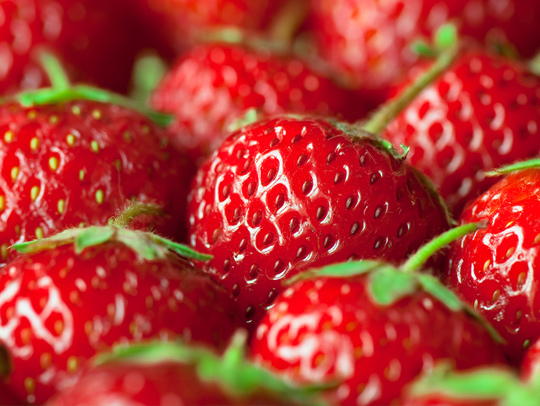Strawberry Consumption Improves Heart Health in Teenaged Males
April 24, 2020 | 4 min to read

WATSONVILLE, Calif. – The 2019 Berry Health Benefits Symposium resulted in a collection of papers recently published in the journal Food & Function. Among the papers was “Effects of short-term consumption of strawberry powder on select parameters of vascular health in adolescent males” authored by Roberta Holt, Carl Keen, and their team at University of California, Davis. Their study contributes towards dietary recommendations for heart disease prevention at a younger age.
Studying Cardiovascular Health in Childhood
Although cardiovascular disease (CVD) is thought of as an adult condition, mothers with high cholesterol during pregnancy may pass on risk for CVD to their children. In addition, the American Heart Association has proposed targeting children to help reduce CVD and stroke deaths because of their increased risk factors like obesity and diabetes. Because heart disease risk can begin in childhood, the research team prioritized teenagers for their study population.
Foods with polyphenols and nitrates- such as strawberries- are associated with a lower risk of heart disease. The following study was designed to focus on strawberries’ impact on male heart health during adolescence.
Research Design
The research team designed a double-blind randomized control trial to determine whether drinking a strawberry beverage would improve heart health after one hour and/or after one week. The 25 teens had a higher risk for heart disease and were asked to drink either a beverage of 50g of strawberry powder mixed with water or a control drink for one week. Lab tests were run before and after the one-week trial. The teens then switched to the other beverage (strawberry or control) for another week.
The mean age was 16 years, and the participants on average were healthy with normal blood pressures, cholesterol, and fasting blood glucose levels.
Results
Although there were no significant improvements in microvascular function, blood pressure, or cholesterol after an hour or a week, there was a significant increase in total plasma nitrite/nitrate one hour after the strawberry drink compared to the control.
The researchers compared those who had an increase in the one week change in total plasma nitrate/nitrite after consuming the strawberry powder (“Responders”) with those who did not (“Non-Responders”). “Responders” did in fact have an improvement in vascular function (increase in both reactive hyperemia index and Framingham RHI), while “Non-Responders” did not.
Conclusion
This small study suggests that a responsive adolescent male population who is at risk for heart disease may benefit from eating a high amount of strawberries for one week. The researchers concluded that “the literature to date strongly supports the concept that the regular consumption of strawberries can be associated with improvements in cardiovascular health.”
However, there are limited long-term studies on strawberries’ impact on vascular function, especially in at-risk populations. More studies are needed in a variety of populations since hormones, sex, age, genetics, and microbial metabolism can affect how the polyphenols in strawberries are broken down and used in the body, and ultimately their effects on heart health.
This study, along with future research, will better inform dietary recommendations about the amount and frequency of strawberry intake to support cardiovascular health at each life stage.
Source: Holt, R.R., Zuelch, M.L, Charoenwoodhipong, P., Al-Dashti, Y.A., Hackman R.M., et al. (2020). Effects of short-term consumption of strawberry powder on select parameters of vascular health in adolescent males. Food & Function, 11, 32-44. Doi: 10.1039/C9FO01844A
About California Strawberries
The California Strawberry Commission represents more than 400 strawberry farmers, shippers, and processors, proudly working together to advance strawberry farming for the future of our land and people. Commission programs create opportunities for success through groundbreaking programs focused on workforce training, strawberry production research, and nutrition research. Through science-based information and education, we deliver good news about sustainable farming practices that benefit the health of people, farms, and communities.
